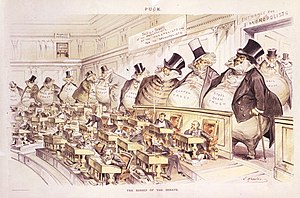Over the years many dominant companies have been humbled by antitrust lawsuits filed by the US Government (Microsoft, Standard Oil, etc.). With the the shut down of monopolies, industries have begun turning into oligopolies, which aren't necessarily any better.

An Oligopoly is defined as a state of limited competition, in which a market is shared by a small number of producers or sellers. So where do we see Oligopolies today?
Right now some of the most prominent industries run by oligopolies are the Entertainment industry, the airline industry, the pharmaceutical industry, and the Oil and Gas industry. Now all of these industry are used everyday by all of us. Whether we are buying gas for our cars, or watching a TV show, people world wide are interacting with these Oligopolies on a daily basis.
Throughout history, there have been laws in place to inhibit the power of monopolies. For example, Teddy "the trustbuster" Roosevelt instituted the Sherman Antitrust Act of 1890. Although it wasn't very effective, it was a start. Now, in the age of oligopolies , it seems as if our government doesn't know how to deal with them. Because there is technically "competition" many oligopolies operate with less government intervention than should be required.
ReplyDeleteWe can see in recent articles we have read in class that oligopolies may have the same effects as monopolies. If companies in a oligopolistic market work together, they can control prices and keep away competition, all while being seen as a "competitive market" and therefore earning little to no criticism or intervention.
ReplyDeleteI do think that oligopolies are becoming more present in certain industries. For instance, Google and Apple have bought smaller tech companies in order to grow their control. I agree with Justin that our government does not know how to approach oligopolies or put restrictions on them. Since there is still a great deal of competition, governments do not intervene when Google or Apple buys another small tech company to increase their power. Not only this but they have tried to expand into other industries such as the music industry and home industry.
ReplyDeleteWhat's scary to think about is that we might not realize that a company has overstepped its bounds until it's irreversible. As the rate of technological discoveries increases, it becomes harder to determine whether a company exploiting that discovery until its patent runs out is going too far. An example of this is how a few pharmaceutical companies have the best insulin formulation under patent and overcharge customers because there's no competition.
ReplyDeleteLike we talked about in class, the mobile network is creating monopolies. What's worse about oligopolies is that these companies impose unfair policies on customers, while making us be under the impression that these companies are not corrupt since we are presented with a variety of options. However, like mobile networks and toothpaste (explained in the oligopoly article), much of the variety of brands are all under one company. As a consumer, it is interesting to decide if I think these brands are really corrupt, or if I don't mind their oligopoly structure, since it makes products accessible.
ReplyDeleteI think an interesting part of oligopolies is how difficult it is to recognize them. Companies can be working together and it's difficult for the consumer to notice. Like we read in the articles, oligopolies or monopolies can own many brands and create products that appear differentiated and separate, when in reality they are all owned by one giant. It's also important to remember that oligopolies and monopolies trying to block entry into the market can be suppressing innovation and advancements, so these large firms or collaborations between companies can be a cause for concern.
ReplyDelete